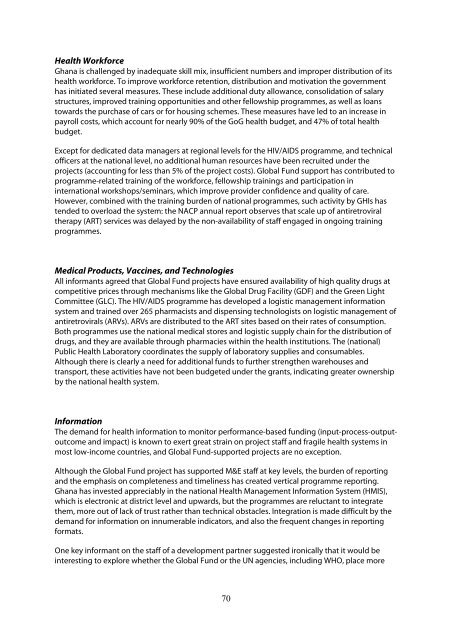MAXIMIZING POSITIVE SYNERGIES - World Health Organization
MAXIMIZING POSITIVE SYNERGIES - World Health Organization
MAXIMIZING POSITIVE SYNERGIES - World Health Organization
You also want an ePaper? Increase the reach of your titles
YUMPU automatically turns print PDFs into web optimized ePapers that Google loves.
<strong>Health</strong> Workforce<br />
Ghana is challenged by inadequate skill mix, insufficient numbers and improper distribution of its<br />
health workforce. To improve workforce retention, distribution and motivation the government<br />
has initiated several measures. These include additional duty allowance, consolidation of salary<br />
structures, improved training opportunities and other fellowship programmes, as well as loans<br />
towards the purchase of cars or for housing schemes. These measures have led to an increase in<br />
payroll costs, which account for nearly 90% of the GoG health budget, and 47% of total health<br />
budget.<br />
Except for dedicated data managers at regional levels for the HIV/AIDS programme, and technical<br />
officers at the national level, no additional human resources have been recruited under the<br />
projects (accounting for less than 5% of the project costs). Global Fund support has contributed to<br />
programme-related training of the workforce, fellowship trainings and participation in<br />
international workshops/seminars, which improve provider confidence and quality of care.<br />
However, combined with the training burden of national programmes, such activity by GHIs has<br />
tended to overload the system: the NACP annual report observes that scale up of antiretroviral<br />
therapy (ART) services was delayed by the non-availability of staff engaged in ongoing training<br />
programmes.<br />
Medical Products, Vaccines, and Technologies<br />
All informants agreed that Global Fund projects have ensured availability of high quality drugs at<br />
competitive prices through mechanisms like the Global Drug Facility (GDF) and the Green Light<br />
Committee (GLC). The HIV/AIDS programme has developed a logistic management information<br />
system and trained over 265 pharmacists and dispensing technologists on logistic management of<br />
antiretrovirals (ARVs). ARVs are distributed to the ART sites based on their rates of consumption.<br />
Both programmes use the national medical stores and logistic supply chain for the distribution of<br />
drugs, and they are available through pharmacies within the health institutions. The (national)<br />
Public <strong>Health</strong> Laboratory coordinates the supply of laboratory supplies and consumables.<br />
Although there is clearly a need for additional funds to further strengthen warehouses and<br />
transport, these activities have not been budgeted under the grants, indicating greater ownership<br />
by the national health system.<br />
Information<br />
The demand for health information to monitor performance-based funding (input-process-outputoutcome<br />
and impact) is known to exert great strain on project staff and fragile health systems in<br />
most low-income countries, and Global Fund-supported projects are no exception.<br />
Although the Global Fund project has supported M&E staff at key levels, the burden of reporting<br />
and the emphasis on completeness and timeliness has created vertical programme reporting.<br />
Ghana has invested appreciably in the national <strong>Health</strong> Management Information System (HMIS),<br />
which is electronic at district level and upwards, but the programmes are reluctant to integrate<br />
them, more out of lack of trust rather than technical obstacles. Integration is made difficult by the<br />
demand for information on innumerable indicators, and also the frequent changes in reporting<br />
formats.<br />
One key informant on the staff of a development partner suggested ironically that it would be<br />
interesting to explore whether the Global Fund or the UN agencies, including WHO, place more<br />
70

















